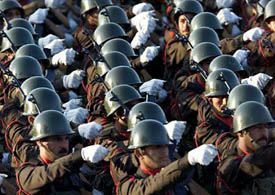 |
| Vol. 3 No. 1 | Table of Contents MEIB Main Page | January 2001 |
Reports of Saddam's stroke planted by Iranian intelligence
 |
| Iraqi troops parade before Saddam on December 31 [Faleh Kheiber/Reuters] |
Iran will back Iraq, Syria in confrontation with Israel
7 December 2000
Al-Hayah al-Jadidah (Ramallah) reports that Iraq has received assurances from Iran that if war erupts between Syria and Israel, and Iraq joins with Syria, Iran will back the two Ba'athist states and will not take advantage of the situation to pursue grievances it still maintains against Iraq. Also Russian Foreign Minister Igor Ivanov advised Baghdad to tone down its bellicose posture towards Israel, lest that give the United States an excuse to attack Iraq. Yet Baghdad rejected the Russian caution. The U.S. had already warned Baghdad not to move forces into western Iraq. Baghdad sent the troops despite the U.S. warning, and nothing happened. So the Iraqis advised Ivanov instead that Russia should lead an international campaign to support Iraq's position in order to undermine U.S. dominance and restore some of the status it has lost over the past decade.
New specialized military unit created
11 December 2000
Al-Hayat (London) reports that Iraq has begun to form a special corps called "Al-Maqdis," to be stationed near the Syrian and Jordanian borders. Reportedly, the new corps will consist of elements from the 2nd mechanized infantry division, in addition to two divisions from "Saddam Fedayeen," and a brigade from the Republican Guard's Hammurabi Division. They will be joined by part of the air defense system operating in the "1st Air Defense Sector," which covers central Iraq, as well as a special force compromising 27 "fedayeen pilots." The commander of the new unit will be Lt. General Hamid Ramadan, who previously headed the Al-Muthanna forces, 8th Division.
Unrest in Diwaniyah continues
11 December 2000
Al-Hayat (London) reported that the building housing the Ba'ath Party leadership in Diwaniyah Governate was attacked by rebels firing several rockets from their jeep. Previously, authorities had found a time bomb under a desk used by the head of the local party branch and succeeded in defusing it, before the bomb exploded.The regime has faced simmering unrest in Diwaniya in recent months. In November, it arrested 50 notables from the southern area. The next month it released twenty of the imprisoned men, but it took the remaining thirty, including a prominent member of the Sha'alan family, into detention in Baghdad, an informed Iraqi opposition source told MEIB.
Iraqi influence in West Bank, Gaza on the rise
12 December 2000
MENL (Jerusalem) reports that Yasir Arafat has given Iraq a free hand to operate in the West Bank and Gaza. Saddam has revived the Baghdad-based Arab Liberation Front (ALF), many of whose members have ties to Iraqi intelligence. Arafat's liaison to Saddam is PA Public Affairs Minister, Azzam Ahmad, who shuttles frequently between Baghdad and Gaza. Saddam has allocated some $890 million to increasing Iraq's influence among the Palestinians. Already the ALF has funneled $500,000 through an Amman bank for distribution to Palestinian families. At Palestinian demonstrations, Saddam is the only foreign leader whose picture is displayed. Egyptian President Hosni Mubarak has warned Arafat against allowing Saddam to extend his influence, but the Israeli government has largely turned a blind eye to this activity. It has so many grievances with Arafat that Saddam's increasing prominence is just one issue on a long list.
State media threatens terrorism against US, Saudi Arabia
14 December 2000
Iraq's state-controlled media continues its threats of terrorism against the U.S. and Saudi Arabia. Iraq Television warned that "a number of Arabian Gulf states are likely to face explosions and operations against U.S. forces in these countries." Iraqi television asserted that the "signs of increased threats" include the "commando operation against the U.S. destroyer Cole in the Gulf of Aden, the car bombings of British experts in Saudi Arabia and the demonstrations against the United States and Zionism." The announcer warned, "If the official relationship with the U.S. administration remains the same, there will be destructive and uncontrollable fires in light of the masses' anger. In such a situation, oil would not be in the hands of the leaders of these countries."
Ten officers executed
19 December 2000
Al-Zaman (London) reports that ten senior Iraqi army officers from the city of Mosul were recently executed on Saddam's orders. Iraqi authorities believed that the officers were involved in plotting a coup, and Saddam's deputy, Izzat al-Duri, was ordered to Mosul to follow up the situation and prepare a quick assessment. At roughly the same time, Qusay was reportedly ordered to move a number of military units around to foil any further coup plans that might be under preparation. Individuals traveling from Amman to Baghdad reported unusually heavy troop movements, including dozens of tanks, armored vehicles, troop carriers, and artillery pieces.
Saudis believe bombings connected to Iraq
21 December 2000
The Independent (London) reports that two Britons are among five people arrested in Saudi Arabia following three small bomb attacks that targeted British citizens in the country, killing one and injuring three others. Officially, the Saudis have attributed the bombings to an illegal network of liquor smugglers. Earlier they detained and released an American. But an informed Saudi source told MEIB that top Saudi officials recognize that this explanation for the bombings is extremely dubious. They understand that the attacks are politically motivated and that they relate to Britain's role in enforcing the no-fly zone in southern Iraq. Saudi authorities also know that their border with Iraq is leaky. Alcohol, drugs, and weapons are regularly smuggled into the country.